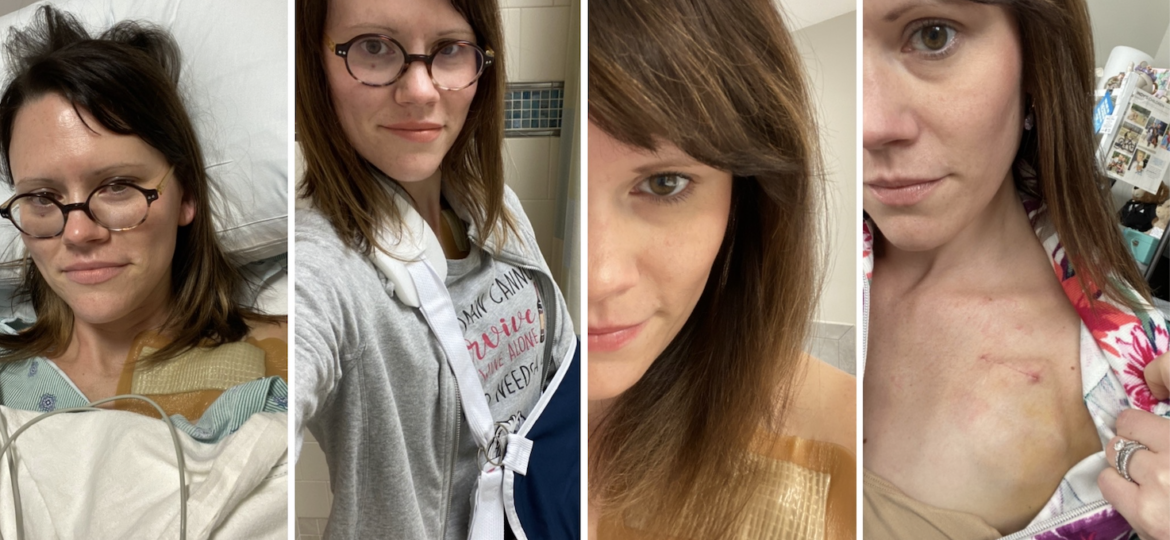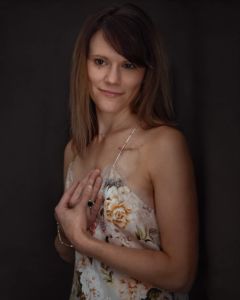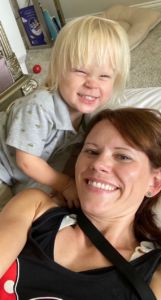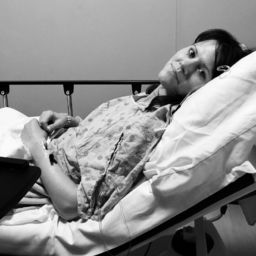
February is American Heart Month, and heart disease is the number one killer of women in the United States, yet only about 38% of research participants are women. But, by advocating for change in cardiovascular studies, heart disease preventive measures, and sharing survivor stories, a positive difference can begin to be made.
To that end, we asked Tess Kossow, a survivor of sudden cardiac arrest at age 37 who moved to Carmel in 2020, to share her story—and she bravely agreed.

How old were you when you were diagnosed with heart disease?
I was 37 years old. An organic eating, clean beauty using, marathon runner, non-smoker with no preexisting conditions…or so I thought, but I can’t really say for sure because I was never tested before.
What happened on October 10, 2020?
I experienced signs of heart attack symptoms in the early afternoon of what started off as a normal day at a pumpkin patch. When I was walking, I suddenly started to feel severe pain in my left arm that eventually led to pressure and unbearable pain in my chest. It was unlike anything I ever experienced before. I was taken by ambulance to a hospital and kept overnight for additional testing. It was when I was being moved out of the emergency room and onto a different floor that I went into sudden cardiac arrest.
National Institutes of Health says that an estimated 290K in-hospital cardiac arrests occur each year in the US. What do you remember about your cardiac arrest?
Not much, as a high dosage of fentanyl erased my memory of the event. I was not hooked up to anything when I went into sudden cardiac arrest (SCA), and cardiopulmonary resuscitation (CPR) and an automated external defibrillator (AED) were both administered to resuscitate me. However, my breathing and heart rate were not at the recommended breaths-per-minute, so I was put in a drug-induced coma and on a ventilator. When I came out of the coma, I still do not have any recollection while laying and living on the ventilator. It was not until I was taken off the ventilator that I begin to have memory of the intensive care unit (ICU).
What was your initial reaction when you were told what happened to you?
Immediate sadness, which turned into paranoia. I was the last person who you would pick in a lineup to have sudden cardiac arrest happen to, or so I thought at the time. There I was, lying in a hospital bed, unable to move from the broken ribs that resulted from CPR compressions at least two inches deep on my chest. Suddenly, I was counting every breath I took, because I was so aware of breathing that it felt awkward. I was unsure of where I stood with my time in life and how to respond to things since there was so much unknown. My husband sat by me every day in the hospital…he was and still is my biggest cheerleader. But that moment is still a time and place and feeling that I can recall to this day.
Did you receive a diagnosis for the events of October 10, 2020?

It is still unclear, but several cardiologists have diagnosed me with Takotsubo Cardiomyopathy, or Broken Heart Syndrome. My furbaby dog, Mr. Big, had died three days prior to the cardiac arrest, so that is the only explanation they could give me, although most cardiomyopathy patients do not go into cardiac arrest and do not have symptoms several days after the initial event. In December 2020, I received a surgically implanted cardiovascular defibrillator to guard over my heart. I am grateful for the care I received from my physicians; I went from eight recovery medications to one, and the follow-up appointments with my local cardiologist have been reduced from every six months to every year.
What has been the hardest thing to hear after your heart disease diagnosis?
There have been two things by two different doctors. The first was that I died, and the second was that this entire episode might have been a “fluke.” Those statements were extremely tough to accept and comprehend.
How have you changed since your diagnosis?

I felt a strong sense of call to action on behalf of all women who have lost their lives or have survived and are struggling to find a new normal after cardiac arrest and heart disease. I was given a second chance at life and to sit still and be quiet about the number one killer of women in the United States was, simply put: not an option. In 2021, I teamed up with The American Heart Association and Go Red for Women and competed for “Woman of Impact in Indianapolis”…and I won! I am the very first Woman of Impact winner in Indianapolis overall, and to receive that title after what I had recently gone through was empowering.
This year, I am the keynote speaker at the Woman of Impact Kickoff with Go Red for Women in Indianapolis. It is truly an honor to turn tragedy into triumph.
I have also incorporated heart health into a branch of my business as a certified fertility coach. My practice incorporates heart disease prevention, and that is also a niche in the market for fertility consulting.
What is the one piece of advice you would like people to hear?
It is easier to ask for forgiveness later than to ask for permission now. Get a cardiologist appointment made for yourself and everyone in your family. Don’t wait for a certain health concern or age to be met or even for your doctor to recommend it. Do it now, wherever you are in life, because with heart disease, sometimes the first sign is too late.
Stephanie Groves is the Executive Editor of Indy Maven and is in awe of Tess’ strength and courage.
All of our content—including this article—is completely free. However, we’d love if you would please consider supporting our journalism with an Indy Maven membership.








